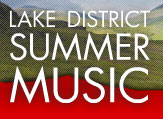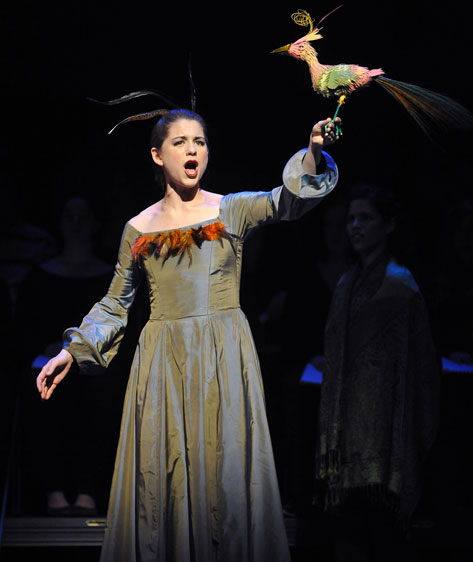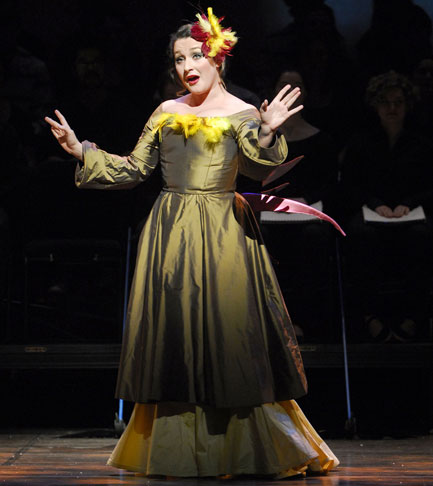News
Posted on Wednesday, September 10, 2008
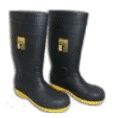
I finished a new piece today, my commission from Carnegie Hall for the wonderful Todd Palmer and the St Lawrence String Quartet. The piece is called
Gumboots, because it draws some of its inspiration from the gumboot dancers of South Africa. What excites me about this piece is that it encapsulates something of a paradoxical outlook on life I have, in which I have an almost nihilistic sense of the meaning of the world, and yet am also eternally optimistic. The fact that humans in general are capable of optimism even when the world is falling apart and terrible things are happening is, I think, a cause for comfort, and the amazing thing is that some of the darker sides of life are often the catalyst for wonderful works of art - gumboot dancing being a case in point.
>>
Details of the concert here
>>
More details and a programme note for the piece herePosted on Tuesday, August 26, 2008
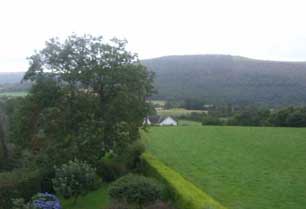
Presteigne is a charming village just over the border from England in mid-Wales. I was invited there this year by festival director George Vass, for the premiere of my
Gigue, a little work with a lot of notes, for harpist Sally Pryce and flautist Adam Walker, who did a great job with a piece which is much harder to play than I realised! (I intend to make a few revisions)
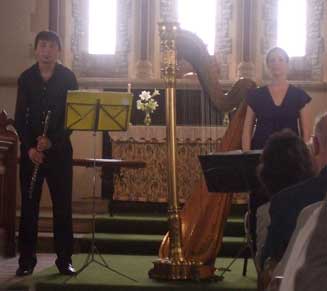
The festival seems to be thriving with almost every concert packed out, even when it's in a tiny church far from the beaten track, and I had the pleaure of meeting several of the other featured composers, including Michael Berkeley, David Matthews and fellow Northerner Joe Duddell.
5 mins of music, 10 hours of driving - but it was worth it!
Posted on Thursday, August 7, 2008
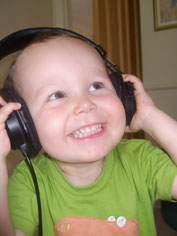
Above is my son Oskar listening to the string quartet that
bears his name. He enjoyed it, but then, as you can see from the picture, he was in an especially good mood! The Heath Quartet gave an excellent first performance at Kendal Town Hall during the Lake District Summer Music Festival yesterday. I decided not to bring the work's dedicatee along to the concert for fear of disruption. But I can officially say that during part of the especially 'bouncy' second movement he definitely danced a little...
and here's the quartet and me receiving a little light thanks from the generous audience
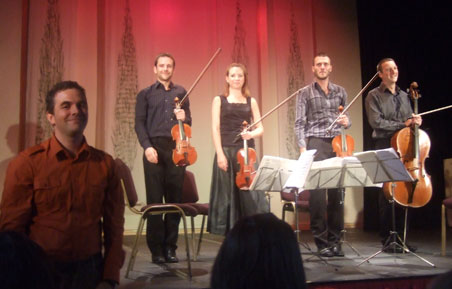
I'm astonished and delighted that after
much struggling I've written a piece for string quartet that I'm happy with, and shows I think a reasonable competence in writing for the instruments. I've decided henceforth I can officially call myself a real composer.
Posted on Tuesday, August 5, 2008

Louise Mott will be reprising her role as Angela from
Push! as part of
Tete a Tete's Opera Festival over the coming days. Louise and other performers will be performing 'Lite Bites' - operatic excerpts of various kinds at assorted venues in the Hammersmith area throughout the festival. The festival itself is the usual fantastic mix of shows from the 'operatic fringe' (and some not so fringe) and is a must for anyone serious about their new opera.
Posted on Tuesday, July 22, 2008
It's nice when life and art interact and feel like they are all part of one larger picture. I first met
Michael Ward-Bergeman at the Carnegie Hall workshops for
Piosenki back in 2006. He introduced me to the
lagerphone and later I introduced him to the famous laments or 'Treny' of Polish poet Kochanowski (I even made a post about it
here)
I built and used the lagerphone for Piosenki, and Michael has decided to set the laments for a new commission from the
Terezin Chamber Music Foundation. The circle is completed in November this year, when Dawn Upshaw will sing both my Piosenki and Michael's new piece, in Carnegie's Zankel Hall (
further details of the concert here).
Michael's now embarked on a series of podcasts about his commission, and in this opening one below, he talks about our friendship, lagerphones, and the laments.
Check our
Michael's blog for further podcasts.
Posted on Monday, June 30, 2008
August brings two new premieres, both from Summer festivals in some of the most beautiful areas of the UK. August 25th is the premiere of my
Gigue for flute and harp at the
Presteigne Festival, and earlier on August 6th it's the turn of the
Lake District Summer Music Festival and the Heath Quartet's performance of my string quartet
Dances for Oskar.
Posted on Sunday, June 29, 2008
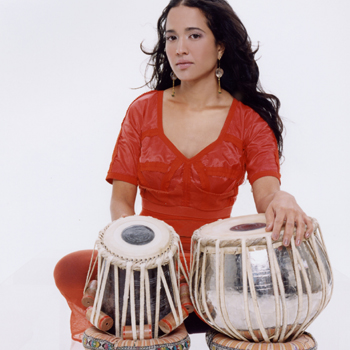 How to play tabla
How to play tabla [PDF - 17Mb]
Many years ago, I took a course in tabla playing. The tutor was of Caucasian origin, but had studied with some great tabla players and clearly knew his Tin Taal from his Keherva Taal. For years since I've had the often hand-written sheets he gave me to learn from and felt they were a fantastic resourse that anyone at my stage of interest in tabla playing (ie just starting out) would find invaluable.
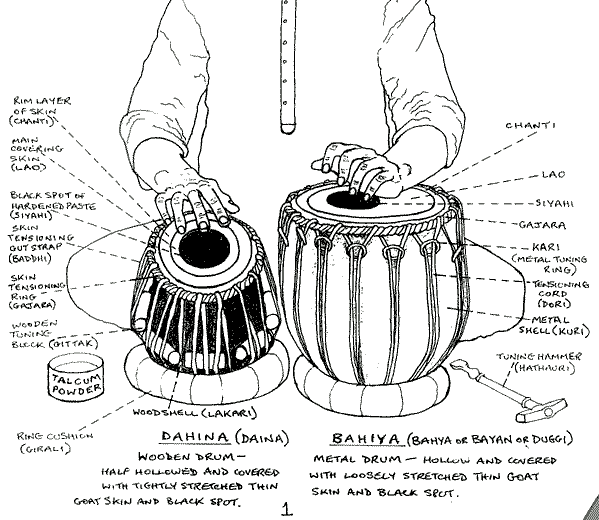
After a question from someone on the
Composition Today site, I finally got round to scanning the sheets in, and have uploaded them here in PDF format.
Unfortunately I no longer have the tutor's name, as it appears nowhere on the lessons, but if he happens to stumble across this, I hope he doesn't mind, and I'd love to hear from him!
How to play tabla [PDF - 17Mb]
Posted on Thursday, June 26, 2008
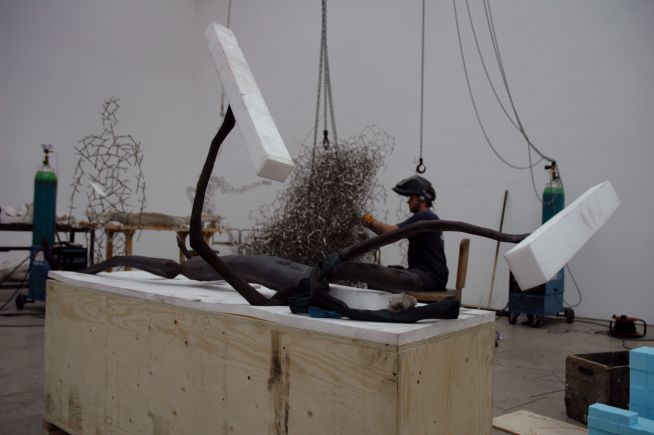
Yesterday I attended a fascinating evening at
Antony Gormley's London studio, where the kreutzer quartet played passionately some rich and evocative music by my old friend Jim Aitchison.
Looking around Gormley's studio was fascinating - there were plenty of his body casts lying around, and a number of his more recent works that build shapes (often body-related) out of thousands of repeated patterns, like this:
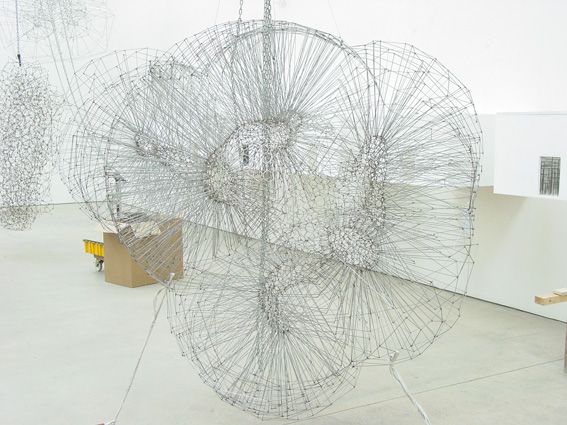
Birtwistle used to sometimes look at a work of art and ask 'What is the musical equivalent of that?' I think Jim went beyond that, using the ideas and structures of the works to inspire his music, and a fascinating response it was. But I couldn't help also returning to Birtwistle's question. What would a piece of music sound like that was so clear and simple in form, yet so new and original, and so thought-provoking. Perhaps Ligeti came somewhere close.
I browsed Gormley's website and came across an article mentioning Gormley's 1993 work Field:
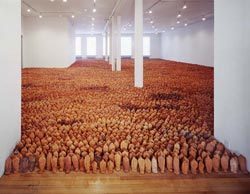
What Gormley says about this work is fascinating, especially if you reflect it back on the music world:
"It came out of a personal crisis. I went back to first principals and started over. I felt the romantic view of the artist as someone standing apart from and remaking the world, was no longer tenable. It was a betrayal of what art could do. Art is nothing without being experienced and shared. And I wanted to start again on that basis".
"In the heroic story of Modernism, artists thought they were emancipating the tools of art from the strictures of representation, making something that could be everyone's. Instead, they ended up being implicated in the institutionalisation of modernity. I think the greatest thing we can try to do now is to take the freedom that art gained in the 20th century and offer it back to the viewer, to make work that really can be everyone's."
Posted on Friday, June 6, 2008
I got hold of these two wonderful pictures of the Bard College performances of
A Bird in Your Ear from photographer
Stephanie Berger - both will make lovely covers to my promotional CDs!
Posted on Wednesday, May 28, 2008
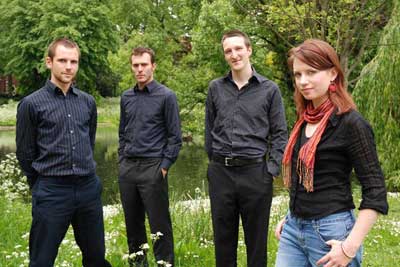
Some mediums are clearly harder to write for than others; for me, the String Quartet is probably the hardest of them all. I know many composers feel the same, for a mixture of reasons -
for composer who like colour (tick) the palette is extremely limited, especially as post-Bartok, almost (note **almost**!) any unusual colour you can think of has been done to the point of cliche
all four instruments demand, I mean really demand, equal treatment. For composers who like a healthy dose of um-cha (tick) or walking-bass (tick) the danger of having your cellist walking out on you are very real - more than that, using the cello as a bass instrument in this way really doesn't sound that great most of the time. It's not without reason that interplay and discussion of four equal partners has become the definition of a good quartet
historically, at least since Haydn's time, composers have written their most intellectual music for the medium. There's a huge weight of history bearing down on you shouting 'WRITE GREAT MUSIC ONLY FOR ME'. Indeed, a violinist in a quartet I worked with recently told me he saw it as his mission as a quartet player to 'save high art' - Yikes! I'm scared!
As far as this last point goes, I love intellectual music - Berg is one of my favourite composers - but I think it was something of a coming of age for me when I realised I'm not really an intellectual composer. I think as soon as I started writing operas I realised I was much more interested in, well, whatever the opposite of intellectual music is - music that's just music, music that moves you in some way, makes you dance, sing, cry, whatever. At least for now I think that's much more what I need to focus on.
So, earlier in the year Lake District Summer Music Festival commissioned a quartet from me for this year's festival, to be played by the exciting young Heath Quartet (pitcured above). After quaking in my boots for some months, when I finally got down to work on the piece it went really surprisingly smoothly. The key decision for me was that these would be a series of 'dances' in the Baroque sense. They would start in one place, explore the possibilities therein and stop. No Beethovenian developments, no 'musical philosophising' if you like. And that did the trick. I wrote five dances, each about 3-4 minutes long, and I'm really excited to hear them at the festival in August. They're called Dances for Oskar.
1 | 2 | 3 | 4 | 5 | 6 | 7 | 8 | 9 | 10 | 11 | 12 | 13 | 14 | 15 | 16 | 17 | 18 | 19 | 20 | 21 | 22 |







